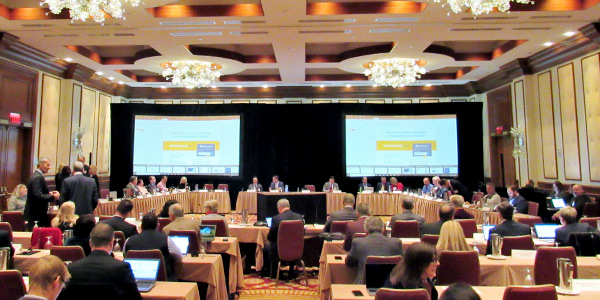MISO on Tuesday won FERC’s approval to create an 11th stakeholder sector for hard-to-categorize members despite some misgivings about the equity of the new arrangement.
The commission’s order means the grid operator can alter its bylaws and Transmission Owners Agreement to include an “Affiliate” sector, which will serve as a repository for new members that can’t be pigeonholed into other sector groups (ER20-1926). The Affiliate sector would also serve as a home for any member that isn’t participating in another sector. Prospective members must declare a sector affiliation before they can join the RTO.
Commissioner Richard Glick dissented in part from the order, saying it was odd and inappropriate for the commission to greenlight rules that it recognized as unfair.
MISO’s Advisory Committee in spring voted to create the sector with the blessing of the RTO’s Board of Directors, which cautioned that the move should be considered a temporary measure and charged the committee with developing a holistic ruleset on how new sectors are created and new members are admitted to them. The board said the AC should ensure all members have full participation in the stakeholder process. (See Board OKs 11th MISO Sector, Orders Redesign.)
The AC has until March to draft a fuller solution for incoming and increasingly diverse MISO members. In the meantime, the committee recommended that the new sector not be allowed a vote in either its or Planning Advisory Committee matters but have one designated non-voting seat for its meetings and be allowed to offer opinions during the its quarterly discussions on industry current events.
The committee began debating the merits of a new member sector last year when Lignite Energy Council (LEC), a North Dakota coal lobbying group, approached MISO about membership. The company did not fit neatly into any of MISO’s existing 10 sectors and was likely to be designated as an “other” in the Environmental and Other Stakeholder Groups sector.
Some AC members said it wasn’t fitting that a sector group would contain entities with diametrically opposed views, contending that a new sector was necessary to ensure the current Environmental sector could have a singular voice.
Coal trade organization America’s Power, coal and iron mining organizations, and some chambers of commerce are also interested in joining the Affiliate sector, according to LEC.
The commission said the proposal seemed to be a “good-faith attempt to provide America’s Power and Lignite Energy Council with an opportunity to participate in the stakeholder process, albeit on an unequal footing, while MISO and its Advisory Committee examine options for a more permanent arrangement for its sector system as a whole.”
FERC also said that because America’s Power and LEC made filings themselves to support the new sector design, it was “reluctant to second guess what is likely a deliberate, informed decision by the interested parties.”
But the commission also warned that it was awaiting a second filing next March on a more permanent solution. It said that if MISO doesn’t make a filing, it may institute a proceeding under Federal Power Act Section 206 against the RTO.
The commission also said that because it couldn’t know what MISO’s new sector design would be, it couldn’t honor America’s Power and LEC’s request to be allowed to block “new entrants with nonaligned viewpoints” from the Affiliate sector.
Glick: Can’t Have it Both Ways
It was FERC’s warning that it would investigate the arrangement if let unrevised that prompted Glick to issue a partial dissent to the order.
“The commission, with one hand, is accepting MISO’s revisions to the MISO Bylaws and Transmission Owners Agreement to create a new stakeholder sector for MISO’s Advisory Committee and, with the other hand, is suggesting that the revisions are, in truth, not just and reasonable or unduly discriminatory and thus should be modified,” Glick said.
He added that the FPA requires FERC to only accept tariff modifications that are just and reasonable.
Glick was quick to note that he thought the arrangement was fair, affording America’s Power and LEC an opportunity to participate in the MISO stakeholder process.
But he said the other commissioners took an “Orwellian turn” when they cautioned MISO that further revisions were needed to the sector setup: “The Federal Power Act does not permit us to have a foot in each camp. Either something is just and reasonable and not unduly discriminatory, or it is not. I cannot join an order that so blatantly ignores this irrefutable law of nature. If my colleagues believe MISO’s proposed revisions do not meet [FPA] Section 205’s requirements, they must reject the proposal. After all, it goes without saying that the commission may initiate a proceeding pursuant to Section 206 of the Federal Power Act if my colleagues believe further revisions are required. What they cannot do is have it both ways.”





